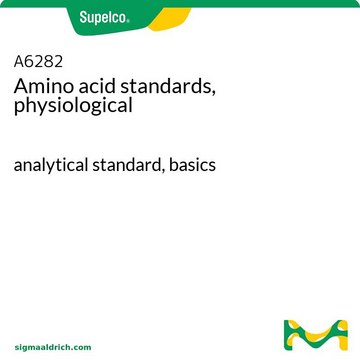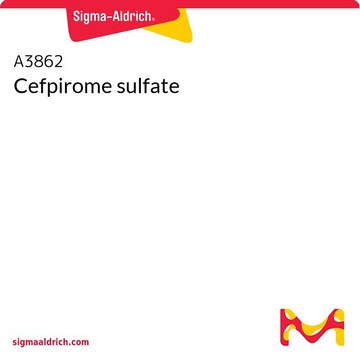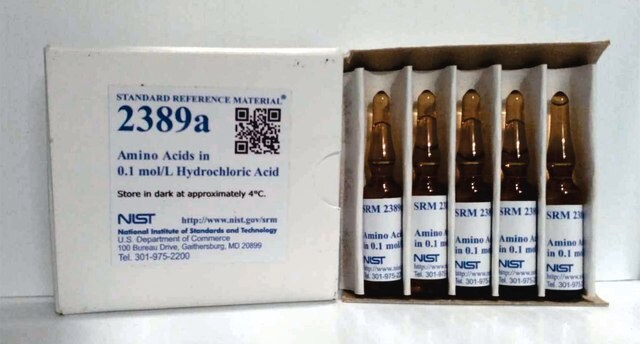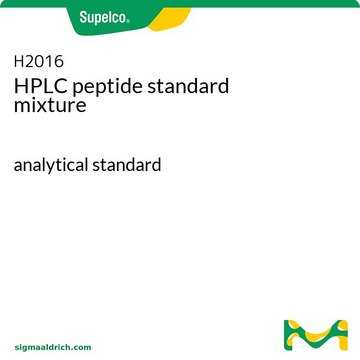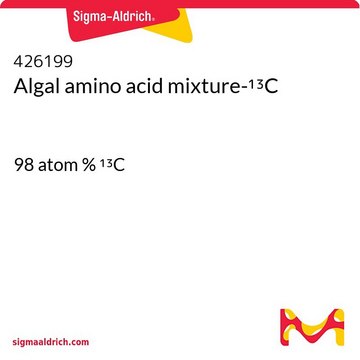A6407
Amino acid standards, physiological
analytical standard, acidics and neutrals
Sign Into View Organizational & Contract Pricing
All Photos(1)
About This Item
Recommended Products
grade
analytical standard
analyte chemical class(es)
amino acids, peptides, proteins
technique(s)
HPLC: suitable
gas chromatography (GC): suitable
color
colorless
application(s)
food and beverages
format
neat
storage temp.
2-8°C
Looking for similar products? Visit Product Comparison Guide
Application
This analytical standard was used as follows:
- Identification and quantification of amino acids in the proteins extracted from two cricket species— A. domesticus and G. bimaculatus, using an amino acid analyzer based on ion-exchange chromatography with Ninhydrin for post-column derivatization
- Free amino acid analysis of plasma samples using an amino acid analyzer to evaluate the effect of induced changes in testosterone levels on protein turnover for a group of 30 healthy human males
- Plasma analysis for amino acids using ultra high-performance liquid chromatography coupled to a single quadrupole mass detector (QDA)
- Determination of 26 clinically essential amino acids in plasma samples by liquid chromatography-tandem mass spectrometry (LC-MS/MS) following amino acid amine derivatization
- To spike samples in the liquid chromatography-mass spectrometry (LC-MS) method-based determination of 39 amino acids and related compounds in plasma and urine samples using a mixed-mode (MM) column
Other Notes
Amino acids listed are 2.5 μmoles per mL except L-cystine at 1.25 μmoles per ml.
Refer to the product′s Certificate of Analysis for more information on a suitable instrument technique. Contact Technical Service for further support.
Signal Word
Warning
Hazard Statements
Precautionary Statements
Hazard Classifications
Met. Corr. 1
Storage Class Code
8B - Non-combustible corrosive hazardous materials
WGK
WGK 2
Flash Point(F)
Not applicable
Flash Point(C)
Not applicable
Choose from one of the most recent versions:
Already Own This Product?
Find documentation for the products that you have recently purchased in the Document Library.
Customers Also Viewed
Amber M Milan et al.
Frontiers in nutrition, 7, 553674-553674 (2020-11-27)
Background: Intolerances to bovine dairy are a motivating factor in consumers seeking alternate-or replacement-dairy beverages and foods. Sheep milk (SM) is an alternate dairy source, with greater protein, although similar amino acid composition compared to cow milk (CM). Studies are
A S Davison et al.
Molecular genetics and metabolism, 125(1-2), 135-143 (2018-07-28)
Concerns exist over hypertyrosinaemia that is observed following treatment with nitisinone. It has been suggested that tyrosine may compete with tryptophan for uptake into the central nervous system, and or inhibit tryptophan hydroxylase activity reducing serotonin production. At the National
M Esperanza Valdés et al.
Food chemistry, 292, 24-31 (2019-05-06)
Must nitrogen is very important for successful fermentation. Irrigation can influence vine nitrogen availability, and therefore must nitrogen content and wine quality. The aim of this work was to assess the effect of vine water status on the nitrogen concentration
Yun Zhou et al.
Neurochemistry international, 123, 101-113 (2018-03-14)
The excitatory amino acid transporter type 2 (EAAT2) represents the major mechanism for removal of extracellular glutamate. In the hippocampus, there is some EAAT2 in axon-terminals, whereas most of the protein is found in astroglia. The functional importance of the
Stefan Jenkins et al.
Frontiers in microbiology, 8, 2618-2618 (2018-01-10)
Exometabolomics enables analysis of metabolite utilization of low molecular weight organic substances by soil bacteria. Environmentally-based defined media are needed to examine ecologically relevant patterns of substrate utilization. Here, we describe an approach for the construction of defined media using
Our team of scientists has experience in all areas of research including Life Science, Material Science, Chemical Synthesis, Chromatography, Analytical and many others.
Contact Technical Service
